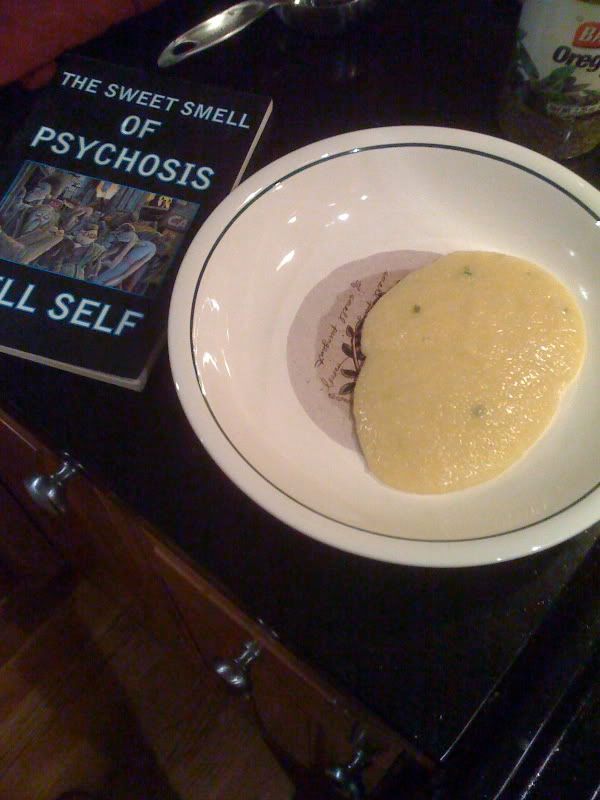The whole damn human race, all of society, those stinking, dirty, human monkeys with their chattering! Prattling on about insignificant bullshit that wasn't anything more than a noise that they made to keep themselves company. It was worse than a herd of parrots, because at least those dumb beasts ("
other dumb beasts," he corrected himself) didn't understand the meaning behind the sounds.
Then again, maybe the chattering monkeys didn't understand what was being understood, either. Jack was sure they could probably break down the words into a sort of cheap, illegible dictionary. Maybe they could actually connect the sounds to the base meaning of each step of the sentence. But could they connect the words together? Could they form some sort of deeper meaning behind the sounds? At what point did they perform a kind of self-lobotomy that rewired their brains, bypassing any sort of analysis, and linking what they've heard directly to the vocal cords?
Maybe it was simply a case of self-doubt. There's a lot of doubt in the world, Jack thought, and that's to be expected. But for generations, the monkeys deceived themselves. No, that's not right. They've
always been deceiving themselves. It was only natural to make first impressions, and jump to conclusions. Hell, no one would ever get anything done without being able to do that. But there seemed to be something that happened from that point. The monkeys just... stopped. "Good enough" was, well, good enough. They built a wall up, keeping out anything that might tell them they were wrong the first time around. That's where the re-wiring starts, he thought. When they don't want to admit they're wrong.
So it's not self-doubt then. It's pride. The inability to admit mistakes. Maybe
that was the original sin. The Sin of Pride wasn't about taking credit for your actions, or about feeling good when you've done well. To be fair, it was true that bragging about it kind of sucks, because it's already happened. You start living in the past; you figure you've got some sort of pass for inaction. But that's not pride. That's what some people wanted Pride to be, because, of, well, Pride. Pride is what keeps you from admitting you're wrong. So, someone twisted it around. Someone fell into a deep pit of Pride, and decided that not only weren't they wrong, they
couldn't be wrong. Pride had to be something other than that. So Pride became admitting you were actually good at something, not that you didn't know what was actually going on.
But without the fear of self-doubt, there'd be no Pride. But who isn't afraid of being wrong? If you admit you're wrong about one thing, then maybe no one will ever believe you again. Then again, why should anyone believe anything they haven't already experienced for themselves? Is this where faith came from? Let's say I tell you that just around the corner, a gorilla is waiting to give you a sack full of dead roses and toaster ovens. Whether you believe me or not depends on how often flora-and-house appliance-wielding primates have skulked around corners. Experience, yeah? Both faith and trust come from experience. So, he'll believe you if you tell him something he already knows. That's not trust, that's buying into Pride. That's running head on into your own fear of self doubt.
Jack's head started to spin with the whiskey and coffee. He tried to get his mind around the whole thing. If you
can't admit you're wrong, if you
won't admit you're wrong, then you simply
aren't. You believe anything someone tells you that you agree with, and reject anything different. Until experience comes along again, and kicks the chair out. So, what's the answer? Make everyone experience everything until no one needs to trust anyone anymore? Not enough years in a lifetime. Trust was just as necessary as jumping to conclusions.
Jack took his cup of coffee-flavored whiskey to the ratty, beat-up couch and propped up his foot. "Damn lying monkeys," he thought to himself. When did the lie begin? It could be said that the lie always existed. We’ve been lying to ourselves since we began to receive information into our brains. Because we naturally forget that what we see isn’t all that’s really out there, and we tell ourselves that what we see is Really Real Reality. Even barring things like hallucinations and optical illusions, we’re not really getting the big picture. Take gamma rays for example. Have you ever seen a gamma ray? No. You might have seen a machine that supposedly clicks when it gets hit by a gamma ray, but all that’s really telling you is that "something" happened.
Jack closed his eyes, and squeezed hard on his lids. Behind his eyes, the demon’s face appeared again. It was happening more often now. He couldn’t escape it when he was awake, either. It used to just be part of his par for the course nightmares, but that one face started appearing more often. It wasn’t that unique a demon, either. Typical red eyes, pointed ears, big horns, toothy grin. It wasn’t frightening, it was… annoying. Like when your 6-year-old cousin tries scaring you, but does it over, and over, and over again. Jack was pretty sure it was going to get creepy eventually. The 6-year-old thing can get creepy too, if they keep at it long enough. The fright moves behind the action, into the motivation: Why does he keep doing that? What’s the hell is wrong with him?
In the case of the demon, it was more the insistence of Jack’s own head that was bothering him. Why that image, why so… cliché? It bothered Jack that his brain was being so trite and unoriginal. "I mean, even if space aliens were beaming their mind-control lasers into my head, I doubt they’d resort to cheap tricks like
that," he muttered to himself. "I liked it better when it was images of impossible perverted sex acts. At least then it was somewhat interesting." He thought back, trying to remember when the dime-store horror image replaced the contorted writhing. All he could come up with was sometime before That Weekend. Not a "lost" weekend, as much as a "found" one. It was one of those handfuls of days that seem to pop out of nowhere.
But that was a lie, as well. Days don’t just pop up, they
happen, over an over again. And even grouping them into 7-piece sections, setting up expectations for certain days over others, that’s just a lie that’s been engraved into the brain so much that the stupid monkeys have made it into a fact. They walk though their lie day, looking at lie things, thinking their lie thoughts. Because when you have deceived yourself with Pride, lying becomes the easiest thing in the world. But wait—doesn’t the lying come first? The deeper lie, perhaps. Somehow, certain people (monkeys) were able to convince other monkeys (people) that what they didn’t experience was true. Then they convinced them that what they
couldn’t experience was true. Big whoppers, too. Big enough to blanket the self-doubt, and then Pride comes along and seals the deal.
Jack scratched his head. It was starting to come together now. He put down his coffee cup on the floor and stared out the window. The stupid monkeys. Their lies. Their Pride. Where was he going with this? The whiskey had gotten to him again, making him slow. Jack was sure he was getting somewhere, something to do with why he always felt an impending weight on his shoulders, the imposition of some sort of "almost". That "almost" was trapping him, holding him back, and keeping him in a holding pattern. He waited.























































